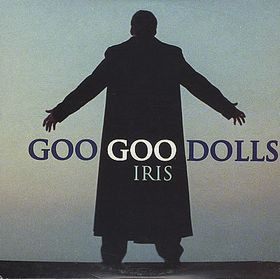The Goo Goo Dolls’ “Iris” is more than just a song; it’s a cultural touchstone that has resonated deeply with listeners since its release in 1998. Originally crafted for the soundtrack of the poignant romantic film City of Angels, starring Nicolas Cage and Meg Ryan, “Iris” transcends its cinematic origins. It stands as a powerful anthem reflecting universal themes of love, vulnerability, and the desire for profound connection, all interwoven with the personal experiences of John Rzeznik, the Goo Goo Dolls’ frontman and principal songwriter.
In this exploration, we will delve into the heart of “Iris,” dissecting its origins, lyrical depth, the wellspring of its inspiration, and the lasting legacy it has carved in the landscape of modern music. We’ll uncover why this song about love, sacrifice, and acceptance continues to captivate audiences worldwide.
 Goo Goo DollsThe Goo Goo Dolls performing live, showcasing their enduring rock presence.
Goo Goo DollsThe Goo Goo Dolls performing live, showcasing their enduring rock presence.
The Genesis of “Iris”: From Movie Soundtrack to Timeless Hit
Hailing from Buffalo, New York, The Goo Goo Dolls emerged onto the rock scene in 1986, founded by John Rzeznik, Robby Takac, and George Tutuska. While they garnered initial acclaim in 1995 with their hit single “Name,” which climbed to number five on the Billboard Hot 100 chart, it was the release of “Iris” in 1998 that catapulted them to iconic status.
Interestingly, “Iris” wasn’t initially conceived for a studio album. Its inception was directly tied to the silver screen, commissioned specifically for a movie soundtrack. The producers of City of Angels, a film centered on an angel’s profound love for a mortal woman and his consequential choice to relinquish his immortality, sought a song that could encapsulate the film’s emotional core. John Rzeznik took on this task, and the result was “Iris,” a song that would eclipse even the film’s popularity.
Decoding the Lyrics: A Journey into Love and Vulnerability
“Iris” opens with a distinctive and emotionally charged guitar introduction, immediately establishing the song’s melancholic yet hopeful atmosphere. The opening lines, “And I’d give up forever to touch you” and “You’re the closest to heaven that I’ll ever be,” directly mirror the angel’s monumental decision in City of Angels to trade eternal existence for the fleeting, yet deeply meaningful, experience of human love.
The subsequent line, “And I don’t want the world to see me, ‘Cause I don’t think that they’d understand,” strikes a chord with anyone who has ever grappled with feelings of isolation or being misunderstood. It speaks to the intensely personal and often isolating nature of profound emotions, particularly love. The lyric “when everything feels like the movies,” further emphasizes the heightened, almost surreal intensity that love can bring into one’s life.
The song’s enigmatic title, “Iris,” was inspired by the name of country singer Iris DeMent, a name that John Rzeznik simply found aesthetically pleasing. However, the name also carries a deeper, more symbolic resonance. In Greek mythology, Iris is the goddess of the rainbow and the messenger of the gods, bridging the divide between heaven and earth, and symbolizing communication and expression. This mythological layer adds depth to the song, suggesting a connection between the earthly realm of human emotion and something transcendent and divine.
The Personal Wellspring of Inspiration: Rzeznik’s Vulnerability
While undeniably influenced by the narrative of City of Angels, “Iris” was also born from a period of intense personal turmoil for John Rzeznik. In a 2010 interview, he openly discussed battling writer’s block, grappling with identity issues, and feeling overwhelmed by the pressures of burgeoning fame. He felt adrift, both creatively and personally. “Iris” became a conduit for him to articulate these vulnerabilities and seek a form of personal acceptance.
Reflecting on this period in a 2019 interview with Louder Sound, Rzeznik shared, “I was feeling kinda schizophrenic. My wife and I had just broken up, and I’d met another girl who I was really into. I’d moved from my home in Buffalo, New York, and was living in this hotel. So it was a really manic time in my life. I was looking for something to hold on to.” This raw honesty underscores the deeply personal roots of “Iris,” transforming it from a movie soundtrack piece into a powerful statement of human emotion.
The Enduring Legacy of “Iris”: A Song That Transcends Generations
“Iris” exploded onto the music scene, dominating the Billboard Hot 100 Airplay chart for an unprecedented 18 weeks and peaking at number nine on the Hot 100 chart. It propelled the City of Angels soundtrack to become one of the best-selling albums of 1998. Subsequently, “Iris” was included on the Goo Goo Dolls’ album Dizzy Up The Girl, alongside other chart-topping singles like “Slide” and “Black Balloon,” further solidifying its place in their discography.
The song garnered three Grammy nominations in 1999 and achieved quadruple platinum certification from the Recording Industry Association of America (RIAA) in 2018, a testament to its enduring popularity and commercial success.
Rzeznik himself has offered profound insights into the song’s enduring appeal, stating, “When I wrote it, I was thinking about the situation of the Nicolas Cage character in the movie. This guy is completely willing to give up his own immortality just to be able to feel something very human. And I think, ‘Wow! What an amazing thing it must be like to love someone so much that you give up everything to be with them.’ That’s a pretty heavy thought.“ This sentiment encapsulates the core of “Iris”: the overwhelming power of love and the profound sacrifices we are willing to make for it.
Conclusion: “Iris” – An Anthem of Timeless Emotion
“Iris” by The Goo Goo Dolls stands as a timeless song, transcending genre and generation. It speaks to the universal human experience of love, sacrifice, and the yearning for acceptance in a way that resonates with listeners across diverse backgrounds and life experiences. Whether viewed through the lens of City of Angels or as a reflection of John Rzeznik’s personal journey of vulnerability and self-discovery, “Iris” remains a potent and poignant expression of raw, authentic emotion. It’s a testament to the power of music to articulate the deepest corners of the human heart, ensuring its continued relevance for years to come.
 Goo Goo Dolls Iris song artworkThe official artwork for Goo Goo Dolls’ iconic song “Iris,” capturing the song’s emotional depth.
Goo Goo Dolls Iris song artworkThe official artwork for Goo Goo Dolls’ iconic song “Iris,” capturing the song’s emotional depth.
Goo Goo Dolls “Iris” Lyrics:
Verse 1
And I’d give up forever to touch you
‘Cause I know that you feel me somehow
You’re the closest to heaven that I’ll ever be
And I don’t wanna go home right now
Verse 2
And all I could taste is this moment
And all I can breathe is your life
And sooner or later, it’s over
I just don’t wanna miss you tonight
Chorus
And I don’t want the world to see me
‘Cause I don’t think that they’d understand
When everything’s made to be broken
I just want you to know who I am
Verse 3
And you can’t fight the tears that ain’t coming
Or the moment of truth in your lies
When everything feels like the movies
Yeah, you bleed just to know you’re alive
Chorus
And I don’t want the world to see me
‘Cause I don’t think that they’d understand
When everything’s made to be broken
I just want you to know who I am
Chorus
And I don’t want the world to see me
‘Cause I don’t think that they’d understand
When everything’s made to be broken
I just want you to know who I am
And I don’t want the world to see me
‘Cause I don’t think that they’d understand
When everything’s made to be broken
I just want you to know who I am
Outro
I just want you to know who I am
I just want you to know who I am
I just want you to know who I am

